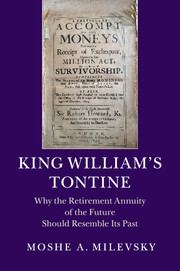Book contents
- Frontmatter
- Epigraph
- Contents
- Preface: In Memoriam for Jared
- Acknowledgments
- 1 King Billy, Protestant Hero of england
- 2 Tontine's Economic Origins: Cheaper Debt
- 3 A Most Curious Will(iam) and Older Than You Think
- 4 The Million Act to Fight a War against France
- 5 Don't Englishmen Die? Anti-Selection vs. Fraud
- 6 Is Your Tontine a Stock or a Bond?
- 7 Optimal Tontine: Hedging (Some) Longevity Risk
- 8 Conclusion: Tontines for the Twenty-First Century
- Epilogue: What Did William Really Know?
- Appendix A The List of Nominees
- Appendix B The Gompertz-Makeham Law of Mortality
- Appendix C 14% for One, 12% for Two, or 10% for Three?
- Source Notes and Guide to Further Reading
- References
- Index
4 - The Million Act to Fight a War against France
Published online by Cambridge University Press: 05 May 2015
- Frontmatter
- Epigraph
- Contents
- Preface: In Memoriam for Jared
- Acknowledgments
- 1 King Billy, Protestant Hero of england
- 2 Tontine's Economic Origins: Cheaper Debt
- 3 A Most Curious Will(iam) and Older Than You Think
- 4 The Million Act to Fight a War against France
- 5 Don't Englishmen Die? Anti-Selection vs. Fraud
- 6 Is Your Tontine a Stock or a Bond?
- 7 Optimal Tontine: Hedging (Some) Longevity Risk
- 8 Conclusion: Tontines for the Twenty-First Century
- Epilogue: What Did William Really Know?
- Appendix A The List of Nominees
- Appendix B The Gompertz-Makeham Law of Mortality
- Appendix C 14% for One, 12% for Two, or 10% for Three?
- Source Notes and Guide to Further Reading
- References
- Index
Summary
WHY WAS A DUTCHMAN THE KING OF ENGLAND?
To the non-English reader – or anyone unfamiliar with British history in the late seventeenth century – it might seem rather odd that a Dutchman, William of Orange, became King William III of England. Dutchman wasn't a nickname. He really was born in what today is called Holland, aka The Netherlands, and spent most of his grown life there. Also he didn't inherit the English throne. He seized it.
So why did William (of Orange) invade England in 1688? What claim did he have to the English throne? Why didn't the English people send him packing back to The Hague? Didn't the existing King of England resist?
The answers to these (good) questions are quite relevant to the historical backbone of this book, which is King William III's need for parliamentary approval to borrow money (via the tontine scheme).
For those readers who are unfamiliar with the Glorious Revolution, this is a good time for a crash course on the fifty-year period from 1650 to 1700. Mind you, this isn't a book about English history nor can I do it justice in a few pages. But with King William III in the title of the book, it's quite reasonable to dedicate some space to this intriguing story; a tale that is rather fascinating in its own right. Here is what you need to know.
There are three main characters in this tale. The first is William (of Orange and then King) himself, the second is King James II of England – William's uncle from his mother Mary's side – and the third player is King Charles II, who is the older brother of James and obviously William's uncle, as well. Charles and James were part of the Stuart family or dynasty.
Figure 4.1 provides a snapshot of (only) the relevant members of the Stuart family – at least as far as this book is concerned – as well as their dates of birth and death.
- Type
- Chapter
- Information
- King William's TontineWhy the Retirement Annuity of the Future Should Resemble its Past, pp. 50 - 79Publisher: Cambridge University PressPrint publication year: 2015



